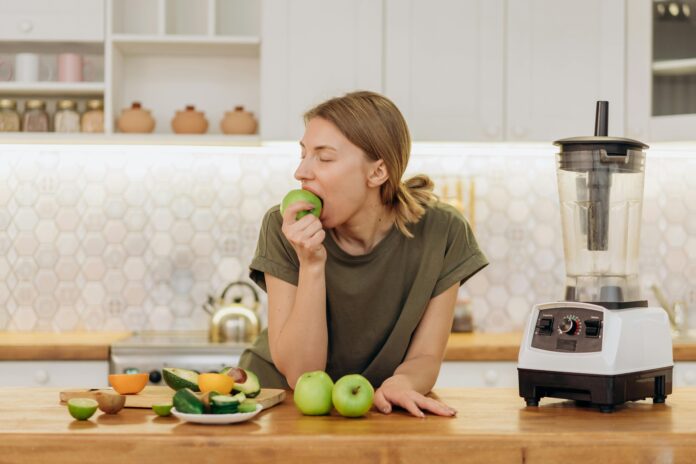Maintaining healthy teeth is essential for not just a sparkling smile, but also good overall health. While brushing and flossing are important factors in keeping our pearly whites in tip-top shape, our diet plays a significant role as well. In this article, we will discuss the do’s and don’ts of what to eat and avoid for healthier teeth, so you can confidently flash your smile without worrying about cavities or gum disease.
Do’s
Eat Crunchy Fruits and Vegetables
Crunchy fruits and vegetables such as apples, carrots, and celery act as natural toothbrushes by removing plaque and food particles from your teeth. They also increase saliva production which neutralizes harmful acids in the mouth that can lead to tooth decay.
If you’re on the go or in a rush, you can still enjoy crunchy fruits and vegetables by packing them as snacks or incorporating them into your meals. For example, add sliced apples to your morning oatmeal for an extra crunch or pack carrot sticks with hummus for a mid-day snack. By making these healthier choices, you not only improve your dental health but also your overall well-being.
Consume Calcium-Rich Foods
Calcium is a vital mineral for strong and healthy teeth. Foods like milk, cheese, yogurt, and leafy greens are excellent sources of calcium that help build stronger enamel and protect against tooth decay.
Drink Plenty of Water
Water not only hydrates our bodies but also helps keep our mouths clean by washing away food particles and bacteria. Drinking water with fluoride also helps strengthen tooth enamel, reducing the risk of cavities.
If you’re not a fan of plain water, try adding some slices of lemon or other fruits for natural flavoring. You can also opt for sugar-free flavored water or unsweetened tea to mix things up. Another option is to invest in a reusable water bottle with a built-in fruit infuser, making it easier to enjoy infused water on the go.
Chew Sugar-Free Gum
Chewing sugar-free gum after meals can help stimulate saliva production, which helps wash away food particles and neutralize acids in the mouth. It also aids in teeth remineralization, making them stronger and more resistant to decay.
Incorporate Probiotics Into Your Diet
Probiotics, found in foods like yogurt, kefir, and sauerkraut, promote good bacteria growth in the mouth. This helps to balance the pH levels and prevent harmful bacteria from causing tooth decay or gum disease.
Incorporating probiotics into your diet doesn’t have to be boring or monotonous. Get creative by adding a spoonful of yogurt to your smoothie, incorporating kefir into your salad dressing, or making sauerkraut as a topping for sandwiches. You can also try making homemade yogurt bowls with fresh fruits and granola for a healthy and delicious breakfast option.
Don’ts
Limit Sugary and Acidic Foods
Foods high in sugar and acid can erode tooth enamel and increase the risk of cavities. Limiting these types of foods, such as candy, soda, and citrus fruits, can help prevent tooth decay.
Avoid Sticky and Chewy Foods
Sticky and chewy foods like dried fruit or gummy candies tend to stick to the surface of our teeth, making it harder for saliva to wash them away. This can lead to plaque buildup and an increased risk of cavities.
If you have loose teeth or teeth implants, sticky and chewy foods can be even more detrimental to your dental health. They can stick to these vulnerable areas and cause damage or loosen the implant. It’s important to be extra cautious with these types of foods if you have any dental issues.
Don’t Constantly Snack Throughout the Day
Frequent snacking, especially on sugary or starchy foods, increases the time our teeth are exposed to harmful bacteria and acids. This can eventually lead to tooth decay and other oral health issues.
To be good about setting snack times, be sure to plan ahead and have healthy snacks readily available. This could include pre-cut fruits and vegetables, nuts, or yogurt. Setting specific designated snack times throughout the day can also help reduce mindless snacking and give your teeth time to recover from exposure to food. Additionally, practicing mindful eating by savoring each bite and properly chewing can help you feel more satisfied and reduce the need for constant snacking.
Stay Away From Hard Candies and Ice
These candies and habits may seem harmless, but they can actually cause chips or cracks in our teeth, leading to potential tooth sensitivity or even a broken tooth. These habits also expose our teeth to harmful bacteria and acids for a longer period of time, increasing the risk of tooth decay. Instead, opt for healthier alternatives like sugar-free gum or frozen fruits for a satisfying crunch without the potential dental damage. Your teeth will thank you!
Avoid Excess Alcohol Consumption
Moderation is key when it comes to alcohol consumption for both our overall health and dental health. Drinking excessive amounts of alcohol can dry out the mouth, leading to reduced saliva production and an increased risk of tooth decay.
Our diet has a significant impact on the health of our teeth. By following these do’s and don’ts, we can ensure that we are making choices that promote strong and healthy teeth. Remember to also maintain good oral hygiene habits such as brushing twice a day, flossing daily, and visiting your dentist regularly for check-ups and cleanings. With a balanced diet and proper oral care, you can have a beautiful smile that not only looks great but also promotes good overall health. Keep smiling!















